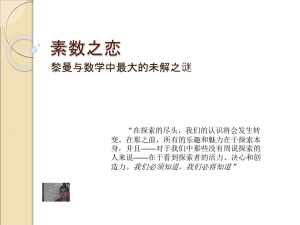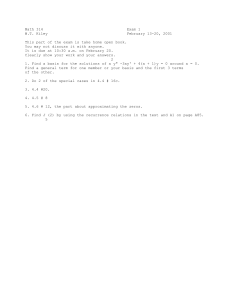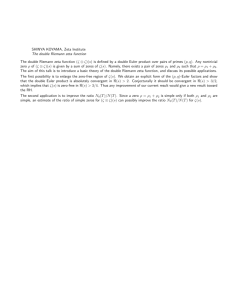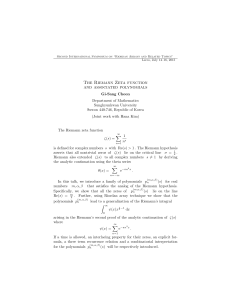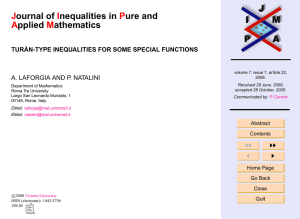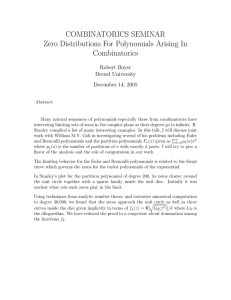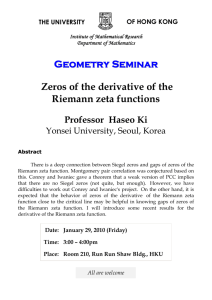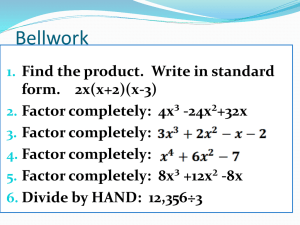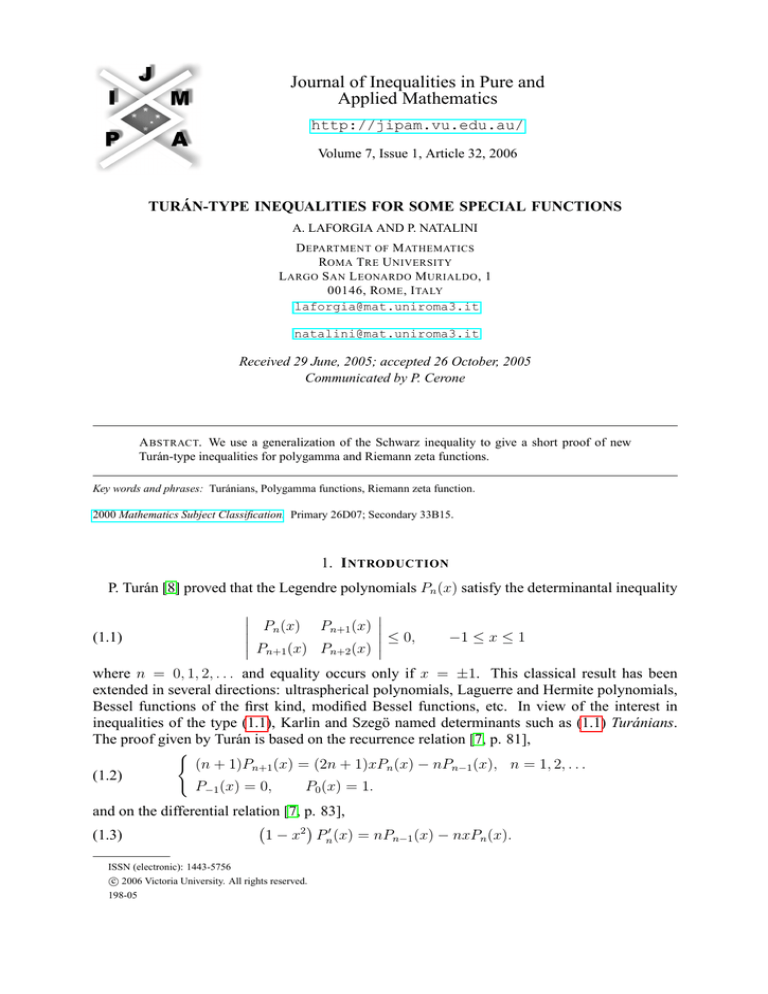
Journal of Inequalities in Pure and
Applied Mathematics
http://jipam.vu.edu.au/
Volume 7, Issue 1, Article 32, 2006
TURÁN-TYPE INEQUALITIES FOR SOME SPECIAL FUNCTIONS
A. LAFORGIA AND P. NATALINI
D EPARTMENT OF M ATHEMATICS
ROMA T RE U NIVERSITY
L ARGO S AN L EONARDO M URIALDO , 1
00146, ROME , I TALY
laforgia@mat.uniroma3.it
natalini@mat.uniroma3.it
Received 29 June, 2005; accepted 26 October, 2005
Communicated by P. Cerone
A BSTRACT. We use a generalization of the Schwarz inequality to give a short proof of new
Turán-type inequalities for polygamma and Riemann zeta functions.
Key words and phrases: Turánians, Polygamma functions, Riemann zeta function.
2000 Mathematics Subject Classification. Primary 26D07; Secondary 33B15.
1. I NTRODUCTION
P. Turán [8] proved that the Legendre polynomials Pn (x) satisfy the determinantal inequality
(1.1)
Pn (x) Pn+1 (x)
Pn+1 (x) Pn+2 (x)
≤ 0,
−1 ≤ x ≤ 1
where n = 0, 1, 2, . . . and equality occurs only if x = ±1. This classical result has been
extended in several directions: ultraspherical polynomials, Laguerre and Hermite polynomials,
Bessel functions of the first kind, modified Bessel functions, etc. In view of the interest in
inequalities of the type (1.1), Karlin and Szegö named determinants such as (1.1) Turánians.
The proof given by Turán is based on the recurrence relation [7, p. 81],
(
(n + 1)Pn+1 (x) = (2n + 1)xPn (x) − nPn−1 (x), n = 1, 2, . . .
(1.2)
P−1 (x) = 0,
P0 (x) = 1.
and on the differential relation [7, p. 83],
(1.3)
1 − x2 Pn0 (x) = nPn−1 (x) − nxPn (x).
ISSN (electronic): 1443-5756
c 2006 Victoria University. All rights reserved.
198-05
2
A. L AFORGIA AND P. NATALINI
L. Lorch [6] established Turán-type inequalities for the positive zeros cνk , k = 1, 2, . . . of
the general Bessel function
Cν (x) = Jν (x) cos α − Yν (x) sin α,
0 ≤ α < π,
where Jν (x) and Yν (x) denote the Bessel functions of the first and the second kind respectively.
Finally, the corresponding results for the positive zeros c0νk ν ≥ 0, k = 1, 2, . . . of the derivd
ative Cν0 (x) = dx
Cν (x) and for the zeros of ultraspherical, Laguerre and Hermite polynomials
have been established in [5], [3] and [2], respectively.
The aim of this paper is to prove new Turán-type inequalities for the polygamma and Riemann
zeta functions. The approach used in the present paper is different from that used in the above
mentioned papers and based, prevalently, on Sturm theory. Here our main tool is the following
generalization of the Schwarz inequality
Z b
2
Z b
Z b
m+n
m
n
2
dt
(1.4)
g(t) [f (t)] dt ·
g(t) [f (t)] dt ≥
g(t) [f (t)]
a
a
a
where f and g are two nonnegative functions of a real variable and m and n belonging to a set
S of real numbers, such that the integrals in (1.4) exist.
2. T HE R ESULTS
Theorem 2.1. For n = 1, 2, . . . we denote by ψn (x) = ψ (n) (x) the polygamma functions
defined as the n-th derivative of psi function
Γ0 (x)
ψ(x) =
,
x>0
Γ(x)
with the usual notation for the gamma function. Then
ψm (x)ψn (x) ≥ ψ 2m+n (x),
(2.1)
2
where
m+n
2
is an integer.
Proof. The polygamma functions have the following integral representation
Z ∞
tn
n+1
(2.2)
ψn (x) = (−1)
e−xt dt,
x > 0, n = 1, 2, . . .
−t
1
−
e
0
We choose the integers m and n both even or odd, in such a way that (m + n)/2 is an integer.
e−xt
By (1.4) with g(t) = 1−e
−t , f (t) = t and a = 0, b = +∞, we get
2
Z ∞ −xt
Z ∞ −xt
Z ∞ −xt
m+n
e
e
e
n
m
(2.3)
t dt ·
t dt ≥
t 2 dt ,
1 − e−t
1 − e−t
1 − e−t
0
0
0
that is
(2.4)
ψm (x) ψn (x) ≥ ψ 2m+n (x),
m, n = 1, 3, 5, . . . or m, n = 2, 4, 6, . . . .
2
The proof is complete.
Remark 2.2. When m = n + 2 we find
ψn (x)
ψn+1 (x)
(2.5)
≥
,
ψn+1 (x)
ψn+2 (x)
n = 1, 2, . . . , x > 0.
Theorem 2.3. We denote by ζ(s) the Riemann zeta function. Then
(2.6)
(s + 1)
ζ(s)
ζ(s + 1)
≥s
,
ζ(s + 1)
ζ(s + 2)
J. Inequal. Pure and Appl. Math., 7(1) Art. 32, 2006
∀s > 1.
http://jipam.vu.edu.au/
T URÁN - TYPE I NEQUALITIES FOR SOME S PECIAL F UNCTIONS
3
Proof. For s > 1 the Riemann zeta function satisfies the integral relation
Z ∞ s−1
1
t
(2.7)
ζ(s) =
dt,
s > 1.
Γ(s) 0 et − 1
By (1.4) with g(t) =
1
,
et −1
f (t) = t and a = 0, b = +∞, we get
Z ∞
2
Z ∞ s−1
Z ∞ s+1
ts
t
t
(2.8)
dt ·
dt ≥
dt .
et − 1
et − 1
et − 1
0
0
0
Further, using (2.7) this inequality becomes
(2.9)
ζ(s)Γ(s)ζ(s + 2)Γ(s + 2) ≥ ζ 2 (s + 1)Γ2 (s + 1)
or, by the functional relation Γ(x + 1) = xΓ(x),
(2.10)
(s + 1)ζ(s)ζ(s + 2) ≥ sζ 2 (s + 1)
which is equivalent to the conclusion of Theorem 2.3.
Concluding remark. Many other Turán-type inequalities can be obtained for the functions
which admit integral representations of the type (2.2). For example starting from the integral
representation for the exponential integral function [1, p. 228, 5.1.4],
Z ∞
En (x) =
e−xt t−n dt,
n = 0, 1, . . . , x > 0,
1
and using inequality (1.4) we find
En (x) Em (x) ≥ E n+m (x).
2
R EFERENCES
[1] M. ABRAMOWITZ AND I.A. STEGUN (Eds.), Handbook of Mathematical Functions with Formulas, Graphs and Mathematical Tables, Dover Publications, Inc., New York, 1965.
[2] Á. ELBERT AND A. LAFORGIA, Monotonicity results on the zeros of generalized Laguerre polynomials, J. Approx. Theory, 51(2) (1987), 168–174.
[3] Á. ELBERT AND A. LAFORGIA, Some monotonicity properties for the zeros of ultraspherical
polynomials, Acta Math. Hung., 48 (1986), 155–159.
[4] S. KARLIN AND G. SZEGÖ, On certain determinants whose elements are orthogonal polynomials,
J. d’Analyse Math., 8 (1960), 1–157.
[5] A. LAFORGIA, Sturm theory for certain class of Sturm-Liouville equations and Turánians and
Wronskians for the zeros of derivative of Bessel functions, Indag. Math., 3 (1982), 295–301.
[6] L. LORCH, Turánians and Wronskians for the zeros of Bessel functions, SIAM J. Math. Anal., 11,
(1980), 223–227.
[7] G. SZEGÖ, Orthogonal Polynomials, 4th ed. Amer. Math. Soc., Colloquium Publications, 23, Amer.
Math. Soc. Providence, RI, 1975.
[8] P. TURÁN, On the zeros of the polynomials of Legendre, Casopis pro Pestovani Mat. a Fys, 75
(1950), 113–122.
J. Inequal. Pure and Appl. Math., 7(1) Art. 32, 2006
http://jipam.vu.edu.au/

